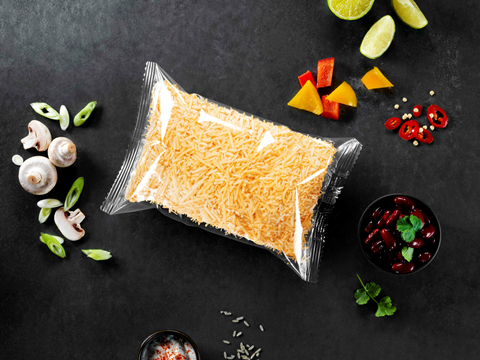
Klöckner Pentaplast (kp) has unveiled two new, fully recyclable barrier flow wrap films, said to lower the weight of food packaging by up to 75% compared to other solutions.
kp FlexiFlow PH 255 R is a polypropylene-based film constituting over 93% PP content. As such, it is said to exceed the specifications of existing packaging guidelines regarding recyclability.
Meanwhile, kp FlexiFlow EH 155 R is a polyethylene equivalent, and is said to contain over 95% PE.
Both films aim to reduce plastic waste by up to 75% compared to alternative packaging solutions without compromising on product protection.
To enhance the films’ visual appeal on the shelf, each provides ‘strong’ aesthetics and antifog technology, with their reported versatility said to suit them to fresh meats, cheeses, processed foods, produce, and various other applications.
Additionally, the films are set to integrate into existing production lines, with kp FlexiFlow PH 255 R believed to reach speeds of up to 120 packs per minute.
“By designing our products with sustainability at the heart, we help food manufacturers to meet increasing consumer and regulatory demands without compromising on quality or efficiency,” said Francisco Quesada, senior commercial and marketing director, Flexibles at kp. “Our expertise at kp is the reason we’re able to do this so effectively.
“As legislation and corporate sustainability initiatives continue to evolve around the world, these new barrier films further cement our position at the forefront of recyclable packaging innovation. By providing options in both PE and PP, we’re ensuring that our customers can select the material best suited to their specific product requirements, and the recycling infrastructure of the markets they’re operating in.
“We’re not just meeting current standards; we’re anticipating future needs and providing solutions to drive the industry forward.”
In similar news, Innovia Films has revealed an ‘ultra-low density’ coextruded OPP film, designed specifically for ice cream flow wrap packaging. Under suitable storage conditions, the film can apparently be stored for a period of 6 months without any risk of deterioration.
Additionally, ExxonMobil and Videplast have developed an ionomer-free vacuum skin packaging solution. This is expected to reduce the thickness of packaging films for small food portions, including meat, cheese, fish, and seafood.
kp also claims to have become the first food packaging business to receive RecyClass’ Traceability Certification with a module focused on closed loop for rPET at its production site in Pravia, Spain. This is said to certify full transparency regarding the rPET flake from food trays used in its Tray2Tray circular recycling initiative.
If you liked this story, you might also enjoy:
The ultimate guide to the Packaging and Packaging Waste Regulation in 2024
How are the top brands progressing on packaging sustainability?
Sustainable Innovation Report 2024: Current trends and future priorities
Everything you need to know about global plastic sustainability regulation














No comments yet